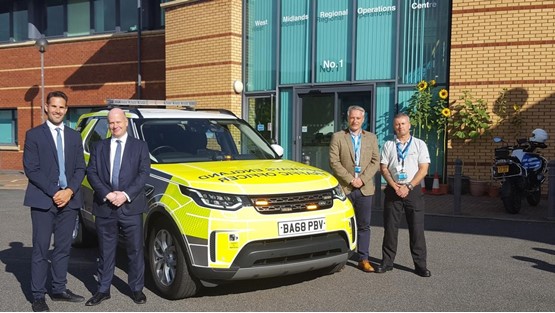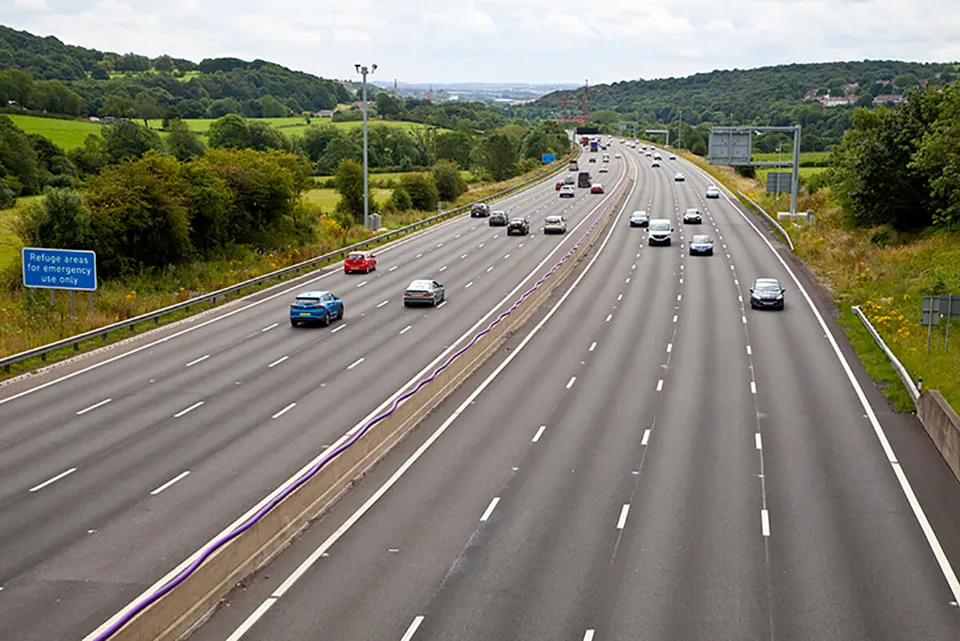A training course has been launched by Highways England to help the roadside recovery industry operate safely on smart motorways.
The new course – Smart Motorways Awareness for the Roadside Rescue & Recovery Industry – will be delivered by the Network Training Partnership (NTP).
It has been designed to provide practical, relevant training to identify safe working practices when attending breakdowns or collisions on the smart motorway network, says Highways England.
The new course has been launched after growing criticism of smart motorways and its red ‘X’ lanes.
Red ‘X’ signs, which denote when lanes are closed, are paramount in safety terms as any stricken driver who has not managed to reach an SOS area is at tremendous risk of being involved in a collision with vehicles that ignore them.
 An SOS area
An SOS area
Almost one quarter (23%) of drivers have driven in a lane on a smart motorway closed by the red ‘X’ sign, RAC research has suggested.
However, Highways England has insisted that smart motorways are as safe as conventional ones.
The eight hour, single day course being launched by Highways England will train recovery vehicle operators to formulate a recovery plan upon evaluating the safe working practices when attending breakdowns or collisions on the smart motorway network.
The course covers the working methods that enable recovery operatives to carry out their vital roles safely.
Key safety principles include:
- Vehicle recovery operators are never expected to recover a vehicle in a live lane on a smart motorway.
- Highways England can close lanes and set speed limits to support recovery operators by setting signs and signals.
- Highways England can allocate traffic officers or call on police resource to ensure recovery vehicle operators’ safety.
A key aspect of the course is that it fits seamlessly with the Driver Certificate of Professional Competence (Driver CPC), which is the standard qualification all professional bus, coach and lorry drivers, as well as recovery operatives, must hold. The course contributes to the 35 hours of training that accredited drivers must complete every five years.
 Caption: Colin Stevenson and Nick Harris from Highways England are joined by Gary Tucker and Paul Jarratt from the Network Training Partnership ahead of the launch of the Smart Motorways Awareness for the Roadside Rescue and Recovery Industry (CPC Course)
Caption: Colin Stevenson and Nick Harris from Highways England are joined by Gary Tucker and Paul Jarratt from the Network Training Partnership ahead of the launch of the Smart Motorways Awareness for the Roadside Rescue and Recovery Industry (CPC Course)
Colin Stevenson, strategic partnerships manager at Highways England, said: “The course has been developed specifically for roadside rescue and recovery drivers who use the motorway network and has been designed to aid practical, relevant training.
“Those completing the course will have a better understanding of the different types of smart motorways and how to formulate a recovery plan incorporating safe working practices when dealing with incidents on smart motorways.”
Smart motorways were introduced in 2006 on the M42 and are intended to increase capacity and reduce congestion at busy times by using the hard shoulder as a running lane and using variable speed limits to control traffic flow.
Mick Puleston, vice president of the Association of Vehicle Recovery Operators (AVRO), said: “AVRO believes that training is key to providing staff with the work skills required to provide a professional image to the industry and applaud Highways England for embracing the recovery industry by introducing a training package specific to our work on the strategic road network which will be endorsed for the Driver CPC.”
Derek Muir, RAC health and safety operations manager, added: “The aim should always be how we make these types of roads as safe as possible both for those operating on them professionally and for customers who use them.
“We welcome Highways England’s engagement on this matter and look forward to working with them to establish best practice and procedures to improve safety on the network.”
Any company which wishes to enrol their drivers on the training should email: SPTC_Driver_Education_Course@highwaysengland.co.uk.




















Login to comment
Comments
No comments have been made yet.